Angered by President Biden’s Summit for Democracy, and filled with scorn for a dysfunctional West, China insists it is more democratic than America https://t.co/S2wF4QSWw4 from @TheEconomist https://t.co/S2wF4QSWw4
— David Rennie 任大伟 (@DSORennie) December 2, 2021
The United States will not apologize for an upcoming summit of democratic nations that only seeks to promote democratic values globally, White House Press Secretary Jen Psaki said Thursday.
“Our objective with this summit is to bring together 110 governments representing diverse democratic experiences around the world, as well as civil society and private sector leaders to discuss how we can work together to protect democracy,” Psaki told a daily press briefing.
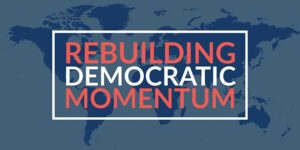 “And it doesn’t mean that we are giving the opposite of a stamp of approval or a negative stamp to people who are not invited,” she said, adding that “no democracy is perfect” and “no democracy is ever final.” “This is just meant to include and invite a diverse set of voices countries who can speak to our global effort to protect democracy.”
“And it doesn’t mean that we are giving the opposite of a stamp of approval or a negative stamp to people who are not invited,” she said, adding that “no democracy is perfect” and “no democracy is ever final.” “This is just meant to include and invite a diverse set of voices countries who can speak to our global effort to protect democracy.”
China has sought to undermine and distort pro-democratic narratives by claiming to represent a non-Western form of ‘whole-process democracy.’
It is not new for autocrats to co-opt benign-sounding labels. During the cold war a quick route to a labour camp was to express dissent in a country with “democratic” in its official name, from North Korea to East Germany. If hypocrisy is the tribute that vice pays to virtue, rigged elections are a dictator’s homage to real democracy: an admission that popular mandates offer moral authority, The Economist’s David Rennie observes:
Describing how governments earn mandates to rule, political scientists distinguish between input legitimacy (eg, an election victory), and output or performance legitimacy (ie, successful policies). China’s rulers claim to enjoy input legitimacy based on public consultation, overseen by local and national “people’s congresses”. Yet the party does not permit elections that it could lose.
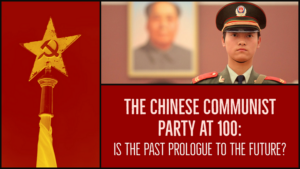 At the same time, the free world should not underestimate this Chinese challenge. Chinese talking points about one-party rule hold some appeal in more countries than Mr Biden may care to admit, he adds.
At the same time, the free world should not underestimate this Chinese challenge. Chinese talking points about one-party rule hold some appeal in more countries than Mr Biden may care to admit, he adds.
Hungary is blocking the European Union from formally participating in U.S. President Joe Biden’s Summit for Democracy later this month because Viktor Orban, the leader of the eastern member country, wasn’t invited, Bloomberg reports. Hungary raised the issue at a meeting of EU ambassadors on Wednesday, saying it wouldn’t back the bloc’s joint contribution to the summit because the U.S. hadn’t invited all EU nations to participate, according to officials familiar with the discussion.
Separately, Hungary was dealt a blow on Wednesday when an adviser to the EU’s top court said the bloc had the right to withhold distributions from the budget and stimulus fund to countries accused of democratic backsliding. Budapest stands to forfeit 7.2 billion euros ($8.2 billion) in recovery money from the EU, it adds.
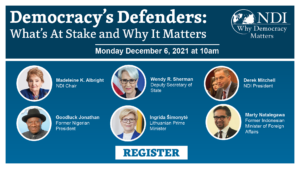 It is good that the United States is taking the lead in this exercise, and doing so through broadly based diplomacy, says analyst Paul R. Pilar. Vocal U.S. championing of democracy is nothing new, of course, but the perceptions of the rest of the world have been shaped in large part by inconsistencies in how U.S. policies have followed U.S. rhetoric, he writes for The National Interest. This month’s meeting has the potential to help reduce at least marginally the widespread cynicism about American objectives.
It is good that the United States is taking the lead in this exercise, and doing so through broadly based diplomacy, says analyst Paul R. Pilar. Vocal U.S. championing of democracy is nothing new, of course, but the perceptions of the rest of the world have been shaped in large part by inconsistencies in how U.S. policies have followed U.S. rhetoric, he writes for The National Interest. This month’s meeting has the potential to help reduce at least marginally the widespread cynicism about American objectives.
China is furious about Biden’s democracy summit, POLITICO’s Phelim Kane observes.
To China’s dismay, Taiwan has been invited to join representatives of 111 democratic countries (several with dubious democratic credentials), he writes:
Though unstated, the Biden administration’s aim is to counter diplomatic, economic and military dangers posed by a rising authoritarian tide spearheaded by the Chinese and Russian governments. China is neither invited to the event nor listed on its agenda, but its focus on “individual and collective commitments, reforms, and initiatives to defend democracy and human rights at home and abroad” will likely produce new initiatives to support democratic states, including Taiwan and Lithuania, facing down Chinese military and economic coercion.
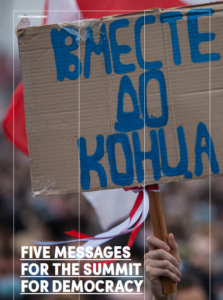 “For Taiwan, this is a big deal … an incredible opportunity to interact with other nations on an equal footing and feel respected in an international arena, while brandishing its democratic credentials,” Anthony J. Saich, director of the Ash Center for Democratic Governance and Innovation at Harvard’s Kennedy School, told China Watcher. “The benefit for [Lithuania] is simply to be seen in a meeting of like-minded nations and to be able to irritate China further by showing that they are still welcome in a big club, of which China is not a part.”
“For Taiwan, this is a big deal … an incredible opportunity to interact with other nations on an equal footing and feel respected in an international arena, while brandishing its democratic credentials,” Anthony J. Saich, director of the Ash Center for Democratic Governance and Innovation at Harvard’s Kennedy School, told China Watcher. “The benefit for [Lithuania] is simply to be seen in a meeting of like-minded nations and to be able to irritate China further by showing that they are still welcome in a big club, of which China is not a part.”
Russia, China and their surrogates have launched a fierce PR offensive against the summit, with Beijing accusing the US of fomenting global color revolutions, while the head of a Moscow think-tank claimed the event is designed to launch an ‘ideological crusade.’
Categorizing the world’s states as democracies or non-democracies “exposes the US’ true intention of weaponizing democracy and using it as a tool and cover to advance its geostrategic agenda and repress dissenting voices,” Foreign Ministry Spokesperson Wang Wenbin said today. “It will only undermine democracy in the name of promoting democracy. In the face of global challenges such as the COVID-19 pandemic, climate change, terrorism and economic downturn.”
Wang also accused the US of “engaging in infiltration and subversion and instigating ‘color revolution’ in sovereign countries through so-called ‘NGOs’ such as government agencies like USAID and the National Endowment for Democracy.”
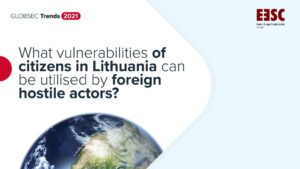 But China seems to be losing the battle of narratives if the Baltic states’ solidarity with beleaguered Taiwan are any indication.
But China seems to be losing the battle of narratives if the Baltic states’ solidarity with beleaguered Taiwan are any indication.
Why are Estonia, Latvia and Lithuania (among other countries) so keen to build links with Taiwan? The Economist asks:
- History is one reason. The governments in many eastern European countries can trace their roots back to the anti-Soviet movements of the late 1980s and 1990s…. Many see similarities between the Soviet Union, which once controlled them, and today’s oppressive China.
- But their concerns are not just historic. In the Czech Republic, for example, public opinion began to sour towards China in 2017 when it was accused by journalists and politicians of trying to interfere in Czech politics by dangling the promise of massive investments….
- There are economic reasons too. Some of these countries have failed to reap much benefit from doing business with China. Between 2000 and 2019, Estonia, Latvia, Lithuania and Slovakia each received €100m ($113m) of foreign direct investment from China, but this was far less than other European countries…
Marcin Jerzewski of Taiwan NextGen Foundation, a Taipei-based think-tank, says there is a growing awareness in central and eastern Europe that Taiwan “is the best partner for sharing best practices against authoritarianism”.
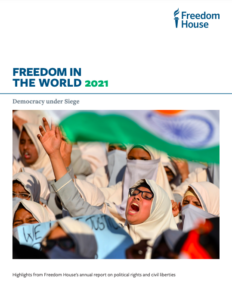 To mark the run-up to the summit, Freedom House has published scorecards gauging the state of freedom in the 112 participating states to “serve as a concise reference tool for summit participants, civil society organizations, the media, and the general public as attending governments make announcements or pledges in support of global democracy.”
To mark the run-up to the summit, Freedom House has published scorecards gauging the state of freedom in the 112 participating states to “serve as a concise reference tool for summit participants, civil society organizations, the media, and the general public as attending governments make announcements or pledges in support of global democracy.”
Each scorecard highlights the country’s democracy score and status (Free, Partly Free, Not Free) according to the group’s latest Freedom in the World report, as well as its internet freedom score from its Freedom on the Net report, where applicable.
“We look forward to this first virtual summit and the year of action to follow, during which Freedom House will work with our global partners in civil society and independent media to make sure governments follow through on the commitments they make as part of this gathering,” said Freedom House president Michael J. Abramowitz.
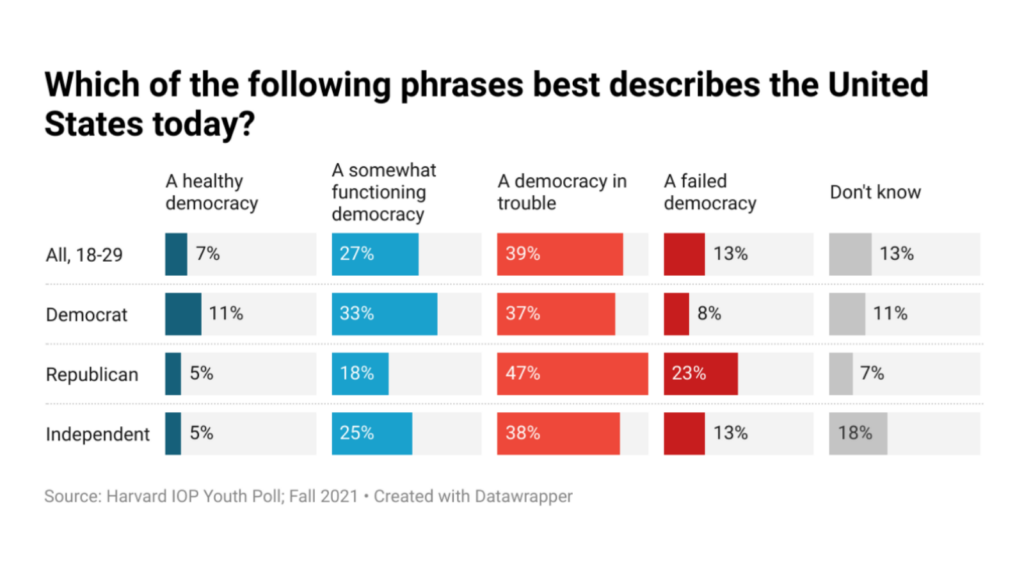
Autocratic states have also been quick to jump on the findings of a new survey of young Americans by the Institute of Politics at the Harvard Kennedy School to suggest that democracy is failing and its troubles are home-grown.
The survey finds that more than half of 18 to 29 year-olds believe US democracy has either “failed” or is “in trouble”. Some 39 per cent of the more than 2,100 young Americans surveyed described the US as a “democracy in trouble” and 13 per cent considered it a “failed democracy”. Only 7 per cent view the US as a “healthy democracy”, while 27 per cent considered it a “somewhat functioning democracy”.

Credit: Rappler
On the eve of the Summit, the National Endowment for Democracy will convene a forum featuring some of the most important voices from democratic struggles’ front-lines, including this year’s Nobel Peace Prize winner, Philippine journalist Maria Ressa (right).
Activists from Hong Kong, Nicaragua, Nigeria, and Russia will discuss global challenges to democracy in conversation with US Legislators. Some of the most dedicated democracy advocates will share insights and expertise on how to rebuild democratic momentum. Former heads of government who helped lead countries through democratic transitions will reflect on how to sustain democracy. Wed, December 8, 2021. 12:30 PM – 1:45 PM EST. RSVP
Agenda
Maria Ressa on “The Global Threat to Democracy from Disinformation”
A conversation with Philippine journalist and 2021 Nobel Peace Prize Laureate.
“Rebuilding Democratic Momentum”
NED Chairman Kenneth Wollack in conversation with leading voices on democracy:
Madeleine Albright, Chair, National Democratic Institute
Senator Dan Sullivan, Chairman, International Republican Institute
Greg Lebedev, Chairman, Center for International Private Enterprise
 “Meeting Authoritarian Challenges around the World”
“Meeting Authoritarian Challenges around the World”
Global Democracy Advocates in conversation with US legislators (TBC)
Berta Valle (Nicaragua)
Vladimir Kara-Murza (Russia)
Nathan Law (Hong Kong)
DJ Switch (Nigeria – right)
“Sustaining Democracy under Challenging Conditions”
Lessons learned from former heads of government
Ricardo Lagos, former President of Chile
José Ramos-Horta, former President of East Timor
Mikulas Dzurinda, former Prime Minister of Slovakia RSVP
NEW TODAY: The 42nd edition of the Harvard Youth Poll finds that a majority of young Americans believe our democracy is in trouble or failing; President Biden’s approval rating among 18-to-29-year-olds drops to 46%.
Full results ➡️ https://t.co/SzAJ4EeDJl pic.twitter.com/pHs89XifxV
— Institute of Politics (@HarvardIOP) December 1, 2021







